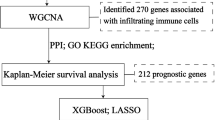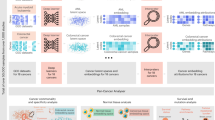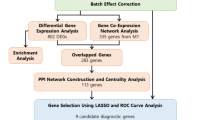Abstract
The development of adaptive immunity and responses to foreign molecules and organisms relies on the highly regulated production of hundreds of proteins. B-cell maturation, from committed progenitors to terminally differentiated plasma cells, is a multistep process that requires the ordered expression of a large number of genes. We studied anti-IgM-stimulated Ramos cells to explore genome-wide expression patterns in differentiating human B-cells. cDNA microarrays were used to measure changes in transcript levels over several days. A large set of genes (∼1500) showed significantly altered expression at one or more time points. The expression profiles were used to construct gene clusters that were then characterized further with respect to the functions of the encoded proteins. Several groups of genes relevant to B-cells were analyzed in detail including early response genes and genes related to transcription, apoptosis and cell cycle regulation. Extensive bioinformatics analyses were conducted to identify the genes/proteins and to study functions and pathways involving B-cells. The results pave the way for understanding the development of humoral immunity, and provide new candidate genes and targets for research and drug development.
This is a preview of subscription content, access via your institution
Access options
Subscribe to this journal
Receive 6 digital issues and online access to articles
$119.00 per year
only $19.83 per issue
Buy this article
- Purchase on SpringerLink
- Instant access to the full article PDF.
USD 39.95
Prices may be subject to local taxes which are calculated during checkout



Similar content being viewed by others
Accession codes
References
Benschop RJ, Cambier JC . B-cell development: signal transduction by antigen receptors and their surrogates. Curr Opin Immunol 1999; 11: 143–151.
Cambier JC . New nomenclature for the Reth motif (or ARH1/TAM/ARAM/YXXL). Immunol Today 1995; 16: 110.
Cambier JC, Ransom JT . Molecular mechanisms of transmembrane signaling in B lymphocytes. Annu Rev Immunol 1987; 5: 175–199.
Law CL, Craxton A, Otipoby KL, Sidorenko SP, Klaus SJ, Clark EC . Regulation of signalling through B-lymphocyte antigen receptors by cell–cell interaction molecules. Immunol Rev 1996; 153: 123–154.
Boise LH, Thompson CB . Hierarchical control of lymphocyte survival. Science 1996; 274: 67–68.
Cambier JC, Monroe JG . B-cell activation. V. Differentiation signaling of B-cell membrane depolarization, increased I-A expression, G0 to G1 transition, and thymidine uptake by anti-IgM and anti-IgD antibodies. J Immunol 1984; 133: 576–581.
Sieckmann DG . The use of anti-immunoglobulins to induce a signal for cell division in B lymphocytes via their membrane IgM and IgD. Immunol Rev 1980; 52: 181–210.
Alizadeh AA, Eisen MB, Davis RE et al. Distinct types of diffuse large B-cell lymphoma identified by gene expression profiling. Nature 2000; 403: 503–511.
Aalto Y, El-Rifai W, Vilpo L et al. Distinct gene expression profiling in chronic lymphocytic leukemia with 11q23 deletion. Leukemia 2001; 15: 1721–1728.
Alizadeh A, Eisen M, Botstein D, Brown PO, Staudt LM . Probing lymphocyte biology by genomic-scale gene expression analysis. J Clin Immunol 1998; 18: 373–379.
Ollila J, Vihinen M . Stimulation of B and T cells activates expression of transcription and differentiation factors. Biochem Biophys Res Commun 1998; 249: 475–480.
Ollila J, Vihinen M . Microarray analysis of B-cell stimulation. Vitam Horm 2002; 64: 77–99.
Fitzsimmons D, Hagman J . Regulation of gene expression at early stages of B-cell and T-cell differentiation. Curr Opin Immunol 1996; 8: 166–174.
Kelly K, Siebenlist U . Immediate-early genes induced by antigen receptor stimulation. Curr Opin Immunol 1995; 7: 327–332.
Fleckner J, Martensen PM, Tolstrup AB, Kjeldgaard NO, Justesen J . Differential regulation of the human, interferon inducible tryptophanyl-tRNA synthetase by various cytokines in cell lines. Cytokine 1995; 7: 70–77.
Krzysiek R, Lefevre EA, Zou W et al. Antigen receptor engagement selectively induces macrophage inflammatory protein-1 alpha (MIP-1 alpha) and MIP-1 beta chemokine production in human B-cells. J Immunol 1999; 162: 4455–4463.
Clevers HC, Grosschedl R . Transcriptional control of lymphoid development: lessons from gene targeting. Immunol Today 1996; 17: 336–343.
Glimcher LH, Singh H . Transcription factors in lymphocyte development—T and B-cells get together. Cell 1999; 96: 13–23.
Lawrence HJ, Helgason CD, Sauvageau G et al. Mice bearing a targeted interruption of the homeobox gene HOXA9 have defects in myeloid, erythroid, and lymphoid hematopoiesis. Blood 1997; 89: 1922–1930.
Ohnishi K, Tobita T, Sinjo K, Takeshita A, Ohno R . Modulation of homeobox B6 and B9 genes expression in human leukemia cell lines during myelomonocytic differentiation. Leuk Lymphoma 1998; 31: 599–608.
Meazza R, Faiella A, Corsetti MT et al. Expression of HOXC4 homeoprotein in the nucleus of activated human lymphocytes. Blood 1995; 85: 2084–2090.
Bhargava AK, Li Z, Weissman SM . Differential expression of four members of the POU family of proteins in activated and phorbol 12-myristate 13-acetate-treated Jurkat T cells. Proc Natl Acad Sci USA 1993; 90: 10260–10264.
Budhram-Mahadeo V, Morris PJ, Smith MD, Midgley CA, Boxer LM, Latchman DS . p53 suppresses the activation of the Bcl-2 promoter by the Brn-3a POU family transcription factor. J Biol Chem 1999; 274: 15237–15244.
Lewis MT, Ross S, Strickland PA, Snyder CJ, Daniel CW . Regulated expression patterns of IRX-2, an Iroquois-class homeobox gene, in the human breast. Cell Tissue Res 1999; 296: 549–554.
Lin CK, Zou HY, Kaptein JS et al. Anti-IgM-induced growth inhibition and apoptosis are independent of ornithine decarboxylase in Ramos cells. Exp Cell Res 1997; 237: 231–241.
de Falco G, Giordano A . CDK9 (PITALRE): a multifunctional cdc2-related kinase. J Cell Physiol 1998; 177: 501–506.
Zhang H, Kobayashi R, Galaktionov K, Beach D . p19Skp1 and p45Skp2 are essential elements of the cyclin A-CDK2 S phase kinase. Cell 1995; 82: 915–925.
Kimura SH, Tsuruga H, Yabuta N, Endo Y, Nojima H . Structure, expression, and chromosomal localization of human GAK. Genomics 1997; 44: 179–187.
Weinstein J . Cell cycle-regulated expression, phosphorylation, and degradation of p55Cdc. A mammalian homolog of CDC20/Fizzy/slp1. J Biol Chem 1997; 272: 28501–28511.
Kao CT, Lin M, O'Shea-Greenfield A, Weinstein J, Sakamoto KM . Over-expression of p55Cdc inhibits granulocyte differentiation and accelerates apoptosis in myeloid cells. Oncogene 1996; 13: 1221–1229.
Lin M, Mendoza M, Kane L, Weinstein J, Sakamoto KM . Analysis of cell death in myeloid cells inducibly expressing the cell cycle protein p55Cdc. Exp Hematol 1998; 26: 1000–1006.
Sadhu K, Reed SI, Richardson H, Russell P . Human homolog of fission yeast cdc25 mitotic inducer is predominantly expressed in G2. Proc Natl Acad Sci USA 1990; 87: 5139–5143.
Morris MC, Heitz A, Mery J, Heitz F, Divita G . An essential phosphorylation-site domain of human cdc25C interacts with both 14-3-3 and cyclins. J Biol Chem 2000; 275: 28849–28857.
Chen F, Studzinski GP . Cyclin-dependent kinase 5 activity enhances monocytic phenotype and cell cycle traverse in 1,25-dihydroxyvitamin D3-treated HL60 cells. Exp Cell Res 1999; 249: 422–428.
Morse L, Chen D, Franklin D, Xiong Y, Chen-Kiang S . Induction of cell cycle arrest and B-cell terminal differentiation by CDK inhibitor p18(INK4c) and IL-6. Immunity 1997; 6: 47–56.
Cohen JJ . Programmed cell death in the immune system. Adv Immunol 1991; 50: 55–85.
Toledano BJ, Bastien Y, Noya F, Baruchel S, Mazer B . Platelet-activating factor abrogates apoptosis induced by cross-linking of the surface IgM receptor in a human B lymphoblastoid cell line. J Immunol 1997; 158: 3705–3715.
Mongini PK, Liu Q, Vilensky MA, Highet PF, Inman JK . Evidence for an upper affinity threshold for anti-IgM-induced apoptosis in a human B-cell lymphoma. Blood 1998; 92: 3756–3771.
Jones TL, Lafrenz D . Quantitative determination of the induction of apoptosis in a murine B-cell line using flow cytometric bivariate cell cycle analysis. Cell Immunol 1992; 142: 348–360.
Valentine MA, Licciardi KA . Rescue from anti-IgM-induced programmed cell death by the B-cell surface proteins CD20 and CD40. Eur J Immunol 1992; 22: 3141–3148.
Toledano BJ, Bastien Y, Noya F, Mazer B . Characterization of B lymphocytes rescued from apoptosis by platelet- activating factor. Cell Immunol 1999; 191: 60–68.
Nakashima T, Sekiguchi T, Kuraoka A et al. Molecular cloning of a human cDNA encoding a novel protein, DAD1, whose defect causes apoptotic cell death in hamster BHK21 cells. Mol Cell Biol 1993; 13: 6367–6374.
Ruiz-Vela A, Gonzalez de Buitrago G, Martinez AC . Implication of calpain in caspase activation during B-cell clonal deletion. Embo J 1999; 18: 4988–4998.
Scaffidi C, Kirchhoff S, Krammer PH, Peter ME . Apoptosis sig-naling in lymphocytes. Curr Opin Immunol 1999; 11: 277–285.
Guedez L, Stetler-Stevenson WG, Wolff L et al. In vitro suppression of programmed cell death of B-cells by tissue inhibitor of metalloproteinases-1. J Clin Invest 1998; 102: 2002–2010.
Su L, David M . Inhibition of B-cell receptor-mediated apoptosis by IFN. J Immunol 1999; 162: 6317–6321.
Ribeiro P, Renard N, Warzocha K et al. CD40 regulation of death domains containing receptors and their ligands on lymphoma B-cells. Br J Haematol 1998; 103: 684–689.
Schneider P, Thome M, Burns K et al. TRAIL receptors 1 (DR4) and 2 (DR5) signal FADD-dependent apoptosis and activate NF-kappaB. Immunity 1997; 7: 831–836.
Hsu H, Xiong J, Goeddel DV . The TNF receptor 1-associated protein TRADD signals cell death and NF-kappa B activation. Cell 1995; 81: 495–504.
Kischkel FC, Lawrence DA, Chuntharapai A, Schow P, Kim KJ, Ashkenazi A . Apo2L/TRAIL-dependent recruitment of endogenous FADD and caspase-8 to death receptors 4 and 5. Immunity 2000; 12: 611–620.
Tamayo P, Slonim D, Mesirov J et al. Interpreting patterns of gene expression with self-organizing maps: methods and application to hematopoietic differentiation. Proc Natl Acad Sci USA 1999; 96: 2907–2912.
Acknowledgements
We gratefully acknowledge financial support from the Finnish Academy, EU BioMed 2 contract CT-983007, the Sigrid Juselius Foundation, and the Medical Research Fund of Tampere University Hospital.
Author information
Authors and Affiliations
Corresponding author
Rights and permissions
About this article
Cite this article
Ollila, J., Vihinen, M. Stimulation-induced gene expression in Ramos B-cells. Genes Immun 4, 343–350 (2003). https://doi.org/10.1038/sj.gene.6363974
Published:
Issue date:
DOI: https://doi.org/10.1038/sj.gene.6363974
Keywords
This article is cited by
-
Molecular characterization of the immune system: emergence of proteins, processes, and domains
Immunogenetics (2007)
-
Dynamic covariation between gene expression and proteome characteristics
BMC Bioinformatics (2005)



